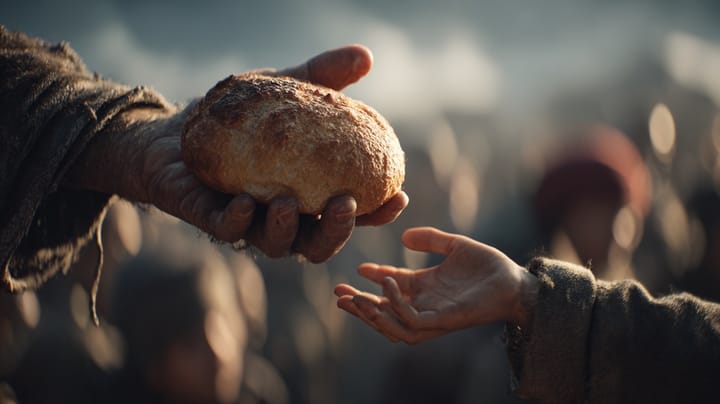Fairhaven Sermon 9-24-2023

Summary
Rev. Peg Bowman’s sermon focuses on the importance of trust in our relationships with God and others. The scripture readings described – Psalm 105, Exodus 16, and Matthew 20 – all touch on the theme of trust. God desires to trust us, just as God is trustworthy and provides for our needs. However, living in a sinful world has broken many people’s trust. The psalm celebrates God’s faithfulness over generations. In Exodus, the Israelites question if God can be trusted to provide in the wilderness. God responds by sending manna and quail. In Matthew, Jesus’ parable challenges those grumbling about God’s generosity to latecoming workers. True kingdom living requires welcoming and sharing generously with others. We demonstrate trust in God by resisting “us vs. them” thinking, being thankful for God’s gifts to all, and celebrating our generous God. Trust is at the heart of love relationships. As we grow in trusting God, we live out God’s way through our words and actions.
In summary, the sermon emphasizes that cultivating mutual trust is vital in our relationship with God. Scripture shows how God consistently provides for and is generous to all people. We live into God’s kingdom by showing that same trustworthiness, generosity, and care for others, overcoming divisiveness. Deepening trust in God helps us live out God’s way faithfully.
Transcript
I don’t know about you, but on the first hearing, today’s scriptures almost feel like a bouquet of flowers that arrives without a note. It’s like great variety, lots of beauty, but where’s the message? Where are we going with this? And so it just, it takes a little while just kind of sink into these scriptures. I think with God, there is always a message and with God ultimately the message is a message of love. But I think this morning the really common thread through the scriptures that we heard is about that that part of love that we call trust.
It’s impossible to have a love relationship without trust. And we know this from our parents, from our siblings, from our spouses, from our friends, even mutually beneficial relationships like employer-employee require a certain amount of trust in order to thrive. And in today’s world, trustworthiness is becoming more and more important, even as it becomes less and less easy to find. And now that we’re in the next election cycle, trust is going to become even more difficult to find.
So how do we know who we can trust? How do we define what is trustworthy? Does being trustworthy mean that a person keeps his or her word? Or does it mean that the person is consistent? Or does trustworthiness mean that we approve of what a person says or does? Does it mean that we agree with them? Does it mean that we believe what they believe? Can a person be trustworthy even if we don’t like the things they say? And then there are the people, far too many people in this world, whose trust has been broken by tragedy or by betrayal or by violence or by crime or by abuse or by silence. And then we bring God into the mix and things become even more complex because God is greater and more powerful than we are. And God does things that we can’t do. And yet God understands the need for trust.
Both our need to trust God and God’s desire to trust us. We’ve often been told through our lives to trust God, and we struggle with that sometimes because God is beyond our ability to understand. But do we ever stop and think that God wants to trust us because God created us to be in relationship with God and our relationship that needs trust in order to thrive? Mutual trust going in both directions is needed for love to be present. There are lots of relationships in this world that don’t require love, relationships that we build around mutual usefulness or a mutual desire for income or for a cause.
These things don’t necessarily require deep trust, just sort of a basic level of mutual agreement. But real love needs deep down honesty and openness, real trust. There’s one theologian over a hundred years ago that once said, To be trusted is a greater compliment than being loved. And I think he might be right about that.
Trust is what our scripture readings are about today. People trusting God and God trusting people. So the psalm we spoke today that we read together is a song of God’s people singing about how trustworthy God is. And the psalms, of course, they were the hymn book of the people of Israel.
These are the songs they sang as they worshipped in the temple. And this particular song sings about telling all the nations all the great things that God has done, everything that God has made, all of God’s miracles, all of God’s judgments, that is God’s truth telling. God is a creator God who created this universe, this planet and every person on it, and God has provided richly for all of us. So our God is a God who can be trusted.
And I was thinking, if we were writing this song today, what would we sing about to God? What are the things that God has done in our lives that help us to trust God? We might think of the beauty of creation, especially now in the fall when everything’s turning all kinds of colors. We might think of family and loved ones. We might think about safe and healthy homes. We might think about the wisdom that God shares with us in the Bible.
What else might we add to that list if we were going to write a song of trust for God? We can also remember that God has been faithful, not only to us, but to our parents and our siblings and our grandparents and our great-grandparents and all of our ancestors as far back as we can remember and even further. And just to give an example of this, a few decades ago, Dad and my sister and I went to Europe to dig up the family tree, find out what we could find out, and we traced Dad’s family all the way back to the 11th century, back to the time of William the Conqueror. We couldn’t go back any further because the records just didn’t exist anymore, at least not in that particular spot. But that’s a thousand years of God’s faithfulness.
And there’s more that we don’t know about. And that’s true for every person here today. God’s faithfulness has been with each one of us, our tribes, so to speak, as far back as memory goes, and maybe further. And that’s what the psalm is singing about today.
The people who wrote this psalm were the descendants of the people we read about in Exodus. When we go back to the time of Moses, and this now is about 475 years before the psalm was written, at this point in Israel’s history, Moses had led the people of Israel out of Egypt and was bringing them into the Promised Land. The people of Israel had been liberated from 400 years in slavery in Egypt. And if we remember that story, the history of that, the people of Israel originally had lived in Canaan, but there was a great famine and the only food to be found was in Egypt, and so they traveled down there and they were able to go there because God had sent Joseph there ahead of time.
We remember that story from Genesis when Joseph, the son of Jacob, was sold into slavery by his brothers, and he came to the attention of Pharaoh while he was in prison and rose to command all of Egypt, including storing up food for a famine that God had said was coming. And eventually the family of Israel arrived in Egypt as refugees and they were welcomed with honor for Jacob’s sake, for Joseph’s sake. But as time passed and Joseph was forgotten, the people of Egypt began to be afraid of the Israelites, and so the Egyptians made them into slaves. And the glory that Israel had once had and the greatness of Joseph was lost in the sands of the desert until Moses came along.
God chose Moses to lead the people of Israel to freedom, to lead them back to the promised land. That’s the same today as God was back then. The story of Israel is the foundation for our Christian faith. Without the promised land, there would be no Messiah, and without the Messiah, there would be no Christianity.
Therefore what we see happening in Exodus is our story too. And today we now live in a wilderness, a modern day wilderness of confusion and mistrust and violence, but we, like the Israelites, are on a journey to the promised land of God’s kingdom. In our reading from Exodus, we see trust being tested. Testing trust is something we all have to do from time to time.
We all kind of need to explore how we feel about certain people and situations. In this case, the people of Israel, after generations of slavery and abuse, they’ve developed some issues around trust, and understandably so. And they want to know, Who is this God that Moses keeps talking about? Why does God care about us? And where has God been all this time when we were slaves? So when our reading begins, Israel has been in the wilderness for a little while and the food supplies that they took from Egypt are starting to run low. And the animals they have with them, they don’t want to eat, basically because back then people, when they didn’t use money much, the animals were sort of, that was their measure of wealth, that was their currency, and they don’t want to eat their future, so to speak.
So here they are in the middle of a desert, many days journey to civilization, and they’re They’re saying to Moses, Why couldn’t God have just left us in Egypt? At least we had food to eat there. These are the words of a people whose hearts and spirits have been broken many times over. And God knows this. God also knows that just like with physical injuries, the first step in healing injuries of the heart is wanting to be well.
And so God wonders, Will these people, so recently rescued from slavery, will they be willing to follow the heavenly doctor’s orders? Will they trust God to begin the healing process? And God explains to Moses, Look, they’re not complaining against you, they’re complaining against me. So God provides meat and bread. First, God sends a flock of quail to eat. Everybody in the camp has enough meat that night.
And the people, the next morning, they find this flaky substance on the ground, which God says can be eaten. And the people look at it and they say, Manna? Which in Hebrew means, What is it? And that was its name, manna. That’s what they called it. And moral of the story, God has provided and God can be trusted.
And then there’s a second moral to the story for those of us who are reading today. Jesus and the disciple of John draws a parallel between manna and himself. During a conversation about manna, Jesus says, I am the bread of life who came down from heaven. God has provided Jesus for us to meet our needs, just like God provided the manna to meet their needs.
This God can be trusted. And finally today we have that passage from Matthew in which Jesus tells us a parable. And the issue here is still trust. Will God’s people trust God to do what is right? And in spite of appearances, this is not primarily a story about employment and workers’ rights.
It poses the question, What’s it like to work for the most incredibly generous boss in the universe? And the answer shines light on the kind of damage that’s been done to God’s people, both then and now, in this sinful world. The parable is about the kingdom of God and about God’s economy. People who believe in God, all people who believe in God, receive the same salvation no matter how long we’ve served, no matter what our title is. In fact, Jesus says the last will be first.
And the people listening to Jesus back in that day would have assumed that the average work day was from 6 a.m. to 6 p.m.
and that a denarius would be a fair wage for a day’s work. In our case, in Jesus’ story, the manager did some things that were not usual. First off, he went out looking for more workers throughout the day. He went 9 a.
m., noon, 5 p.m. 5 p.
m.?! One hour before quitting time. And Jesus doesn’t say why, but we can assume that there must have been an awful lot of work to be done, and all hands were needed on deck. And so God got as many people as he possibly could, and this is certainly true of God’s kingdom and God’s people.
We need all the folks we can get on deck. But at the end of the workday, Jesus’ story, there are two surprises. First off, the people who were hired last were paid first, which is a reverse of what would be normal back then. the first hired to be the first paid.
And secondly, everyone got paid the same amount. This landowner, this boss that they’re working for– in other words, God– is wise and generous and has the right to give away his possessions as he chooses, to be as generous as he likes. But the workers aren’t happy, at least not the ones who worked all day. They are grumbling, not because they were paid unfairly, because they got the wage they agreed to, But they’re complaining that the latecomers should have received less.
Their complaint is, You have made them equal to us. Their problem is not envy, because envy is wanting something someone else has. The problem is that they were wishing that some people didn’t have as much as they had. It’s a complaint of the privileged, in a sense.
It’s one that we are very familiar with in our society. In this society, we believe that if you work hard, you’ll be rewarded, that you get out what you put in. In the economy of heaven, life in God’s kingdom is always a gift. It cannot be earned.
Nothing we can do can get us there. And if we are living in the kingdom of God, it’s because God has been generous. No exceptions. The landowner in the story who represents God, his question to the people who are grumbling, and this is the literal translation, he says, Is your eye evil because I am good? In the ancient world, people believed that the eyes put out rays like light to make it possible to see.
like almost like little flashlights. And that’s how we were able to see. That’s what they believed about the eyes. And so the problem that Jesus says, the problem that people have been working since 6 a.
m., they said that he says that they failed to see, that their eyes aren’t working right. What should have been a we situation, all the workers working together, became an us versus them situation. Instead of saying, We are working together to accomplish something, their cry was, You’re being unfair.
Their eyes were not seeing in a healthy way. And again, it’s all about trust. When we live God’s way in God’s kingdom, we demonstrate our trust in God. We trust that in God’s kingdom there will always be enough and more to share.
We show our trust by welcoming others, especially those who haven’t had the privileges we have. We show our trust by standing against the us versus them thinking that is so common today. Everything has to become a debate these days. Have you noticed that? And then finally, above all, we thank God for God’s generosity to us and to others.
We celebrate our generous, trustworthy God in song and in service. In God’s kingdom, the words You have made them equal to us is a cause for celebration. Which brings us back to where we started. In our relationship with God, it’s all about trust.
God wants to know if we will take the wisdom that God gives us and use it for others. God who loves us more than he loves his own life, as we saw in Jesus Christ, wants to know that he can trust us, trust us to listen, and trust us to live God’s way. And we live life God’s way when we hear or read God’s Word and believe it and allow it to come alive in our lives. We live life God’s way when we look to God to be the source of our joy and inspiration.
We live life God’s way, as Jesus says, when we share God’s blessings with others, no matter how long they’ve been with us, no matter if they’re strangers. In God’s house, there is enough and more for everyone. And when we know this, we can trust God. So let’s pray together.
Pray with me. Lord, thank you for entrusting us with your Word and your many generous gifts. Help us to trust you more with every passing day. If we have any doubts or fears today, we bring them to you now.
Build up in us the knowledge of your word and the trust to live it through to your honor and glory. Amen.


